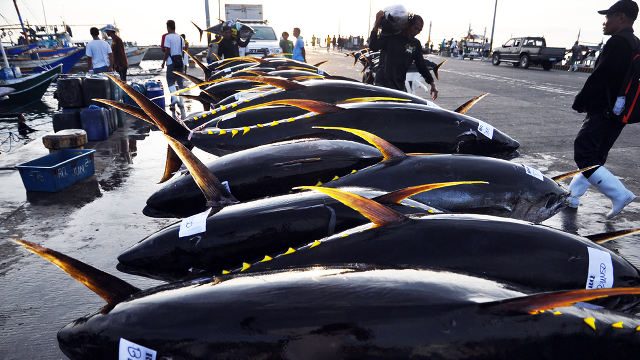SUMMARY
This is AI generated summarization, which may have errors. For context, always refer to the full article.

MANILA, Philippines – A European Union decision expected to be announced this December may shave off the Philippine fishing industry’s revenues by billions of pesos.
This month, the EU is expected to decide on what to do with the yellow card it had slapped on the Philippines for failing to meet international standards on curbing illegal, unreported, and unregulated (IUU) fishing.
It may decide to extend the yellow card, lift it, or impose a graver warning – a red card that bans the Philippines from exporting its fish products to the EU.
A ban could cost the Philippine economy billions of pesos. In 2013 alone, Philippine fish exports to the EU was valued at P9.4 billion (165 million euros), according to data from the Bureau of Fisheries and Aquatic Resources (BFAR).
When the yellow card was issued in June, the EU gave the Philippines 6 months to improve its mechanism to fight IUU fishing which has been blamed for over-exploited fishing grounds and depleted marine resources all over the world.
The EU warning requires the Philippines to “amend their legal framework to combat IUU fishing, improve control and monitoring actions and take a proactive role in complying with international law rules.”
Over the past few months, the BFAR has been working with lawmakers and fishing sector stakeholders to draft a revised Philippine Fisheries Code, one of the EU’s major requirements.
President Benigno Aquino III is expected to sign amendments to the 16-year-old code any day now to meet the EU deadline. (READ: Small fishers hit ‘rushed’ revision of fisheries law)
In fact, fisheries reform advocates told Rappler Aquino was set to sign it in the second week of December but was stalled by Typhoon Ruby (international name Hagupit). While that was the official reason given, activists say the delay was reportedly due to heavy lobbying by some commercial fishers who find the amendments oppressive and unfair.
‘Cruel and unusual’ penalties
The Alliance of Philippine Fisheries Federations Inc explained their fierce opposition to the amendments in a full-page advertisement published in the Philippine Daily Inquirer on Tuesday, December 16.
They mainly balked at the huge fines to be imposed by the new law which they described as “cruel” and “unusual.”
In the new code, commercial fishers will be fined P2 million to P45 million ($44,800-$1 million) – or 5 times the value of their catch – if they fish without a complete permit.
For destroying wildlife habitat, they will have to pay P1 million to P3 million ($22,400-$67,100). For violating Environmental Compliance, they will be fined 8 times the value of damaged coral reefs – around P500,000 to P10 million ($11,200-$224,000).
In comparison, other extractive companies like mining firms or logging contracts are imposed much smaller fines, said the group.
For lacking a permit, a mining company pays only a fourth of what a commercial fishing company pays – P50,000 ($1,100). For “coercion,” they will pay P100,000 to P5 million ($2,200-$112,000) while a logging company pays only P5,000 ($112).
But the mining law is also set to be amended, with new mining agreements put on hold while the revenue-sharing arrangement in the mining reform bill is still being fleshed out.
There are also calls from environmentalists to update the almost 4-decade-old Forestry Reform Code.
No reason to fear
Supporters of the amendments question the motives of commercial fishers for resisting the penalties.
“If one does not have the intention to violate the law, then they have no reason to fear. The fact that they consistently argue that the penalties are too high suggests the intention to conduct illegal fishing,” Vince Cinches of Greenpeace Philippines told Rappler on Wednesday, December 17.
The fines imposed by the current code are too small to intimidate commercial fishers who employ destructive fishing methods or fish where they are not supposed to, he said.
Lack of discipline and poor regulation of commercial fishers has led to overfishing in the Philippine seas. It’s likely a major reason why 10 out of the country’s 13 major fishing grounds are over-exploited, according to BFAR data.
In 2011, 20% to 32% of the tuna the Philippines exported to the US was said to be illegally caught, said Cinches.
While commercial fishing companies say fish stocks naturally replenish every 3 months, data from the World Fishing Center say fish are currently being caught at a rate that is 30% above the level where they can restore themselves.
Wily commercial fishing vessels are also known to fish in municipal waters where they are prohibited. By law, fishing grounds within 15 kilometers of the shoreline are reserved for municipal or small fisherfolk – fishermen who use boats of 3 tons or less.
When commercial fishing vessels encroach on municipal waters, they tend to deplete fish stocks there quickly because of their huge capacity, leaving small fisherfolk to make do with the little that’s left.
Cinches admitted that not all commercial fishers break the law. In fact, it’s honest commercial fishers who have nothing to fear from the law and who stand to benefit from well-protected seas.
Other requirements
Amending our fisheries law is just one of the EU’s requirements. The EU also wants a mechanism to monitor all fishing vessels and a system of certifying the origin of all fishing products.
BFAR Director Asis Perez, said in a previous interview with Rappler that the vessel-monitoring system is already in the works and that the amended fisheries code is the last of EU requirements they are yet to meet.
He said his agency is “doing everything humanly possible” to show the EU good progress. – Rappler.com
Add a comment
How does this make you feel?
There are no comments yet. Add your comment to start the conversation.